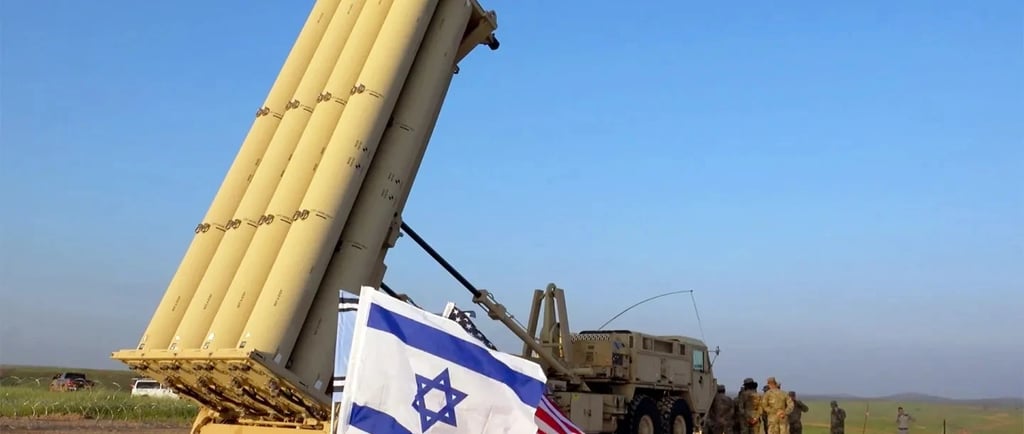Pentagon seeks billions in ‘emergency funds’ to restock arms used in defense of Israel
Israel has also recently begun accelerating development of missile defense systems, as concerns grow of a potential re-escalation with Iran
TheCradle.co
8/21/20253 min read


The Pentagon is seeking over $3.5 billion to replenish weapons and defense systems used to protect Israel, Bloomberg reported on 19 August – citing budget documents.
The documents, which were prepared through mid-May, indicate that the funds are meant for restocking interceptor missiles as well as other tasks including radar upkeep, refurbishing vessels, and transporting munitions.
Every paragraph listing the items is tagged as an “emergency budget request.”
The spending is described as necessary to make up for costs linked to the US army’s responses to the “situation in Israel,” as well as operations “executed at the request of or in coordination with Israel for the defense of Israeli territory, personnel or assets during attacks by Iran [or its allies].”
The request centers on missile interceptors fired since October 2023, including around $1 billion for RTX’s SM-3 systems, which US Navy destroyers used in April 2024 against Iranian strikes.
Another $204 million is allocated for Lockheed Martin’s THAAD interceptors.
The budget papers highlight growing costs for the US military presence in West Asia and rising concerns in Washington over the ability to replenish supplies while continuing to arm Israel.
Since October 2023, Washington has burned through a significant number of interceptors in operations to defend Israel and confront Yemeni attacks in the Red Sea, according to a report by Responsible Statecraft.
In October 2023, the US had approximately 9,100 SM‑2, 400 SM‑3, and 1,500 SM‑6 interceptor missiles in stockpile.
It has used 268 SM-2s, 159 SM-3s, and 280 SM-6s since then, including during the June 2025 Iran–Israel war. According to an estimation, there has been a three percent depletion in SM-2 stockpiles, a 33 percent depletion in SM-3 stockpiles, and a 17 percent depletion of SM-6 stockpiles.
Budget documents cited by The War Zone show that roughly 25 percent of all THAAD interceptors (over 150) funded to date were used to intercept Iranian missiles in June 2025.
An October 2024 Wall Street Journal (WSJ) report noted that the number of inceptors deployed since October 2023 cost Washington $1.8 billion.
This could easily have been doubled by the end of June 2025, Responsible Statecraft noted.
In the latest US campaign against Yemen alone, which lasted from March until May, Washington burned through around $1 billion in munitions.
At the height of the June war between Iran and Israel, WSJ reported that Israel was “running low” on interceptors. At the time, the source cited in the report said there was concern that “about the US burning through interceptors as well.”
Wednesday’s Bloomberg report comes as Israel has recently initiated plans to accelerate development of its own missile defense systems.
This has coincided with concerns over a potential resumption of war between Israel and Iran, which fired around 500 ballistic missiles at Israeli targets between 13 June and 24 June.
An Iranian military official said on 17 August that Tehran continues to consider that it is in a state of war, and that a confrontation with Israel could erupt “at any moment.”
The official added that Tehran should “adopt an offensive strategy,” while signaling potential pre-emptive action from the Islamic Republic.
Recent reports have indicated Iran is receiving Chinese help to restock and rebuild its arsenal of missiles in preparation for a potential re-escalation.
An analysis written by Trita Parsi for Foreign Policy, released on 11 August, suggested a potential resumption of the Israel–Iran war. Parsi is the executive vice president of the Quincy Institute for Responsible Statecraft and the founder and former president of the National Iranian American Council.
“Israel is likely to launch another war with Iran before December – perhaps even as early as late August. Iran is expecting and preparing for the attack. It played the long game in the first war, pacing its missile attacks as it anticipated a protracted conflict. In the next round, however, Iran is likely to strike decisively from the outset, aiming to dispel any notion that it can be subdued under Israeli military dominance,” he said, warning that the next battle would “be far bloodier than the first.”
He also said Iran is “expecting and preparing” for an upcoming Israeli attack.
Statehood for Peace and Freedom
Exploring pathways to lasting Middle East peace.
contact@statehoodforpeace.com
© 2026. StatehoodForPeace.Com - All rights reserved.


